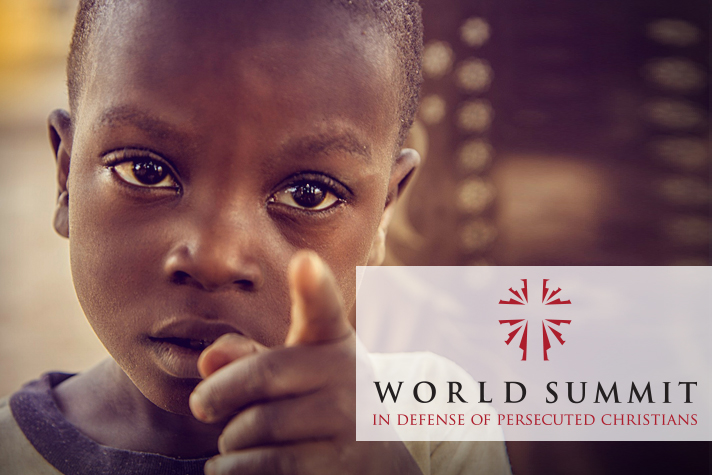
The Billy Graham Evangelistic Association is holding the first World Summit in Defense of Persecuted Christians, where hundreds of church leaders, victims of persecution and others are meeting to advocate for change regarding the recent, unprecedented persecution of Christians throughout the world. Leading up to the summit, BillyGraham.org has shared stories from Christ followers persecuted for their decision to follow Jesus. Today, we focus on the cost of being a Christian in Sudan.
“Indeed, all who desire to live a godly life in Christ Jesus will be persecuted.” —2 Timothy 3:12
The Bible says persecution of Christ followers is inevitable, and nobody knows that better than the following three gentlemen from Northern Africa.
To protect their identities, we’ll call them Bishop Gabriel, Ishmael and Bishop Patrick, and each has a unique perspective on the cost of being a Christian in Sudan, a country ranked fifth on Open Doors World Watch List, which enumerates countries most hostile toward Christians. Yet in the midst of extreme persecution, each man has decided to choose Christ, radiate His love and stick to the mission—no matter what.
The Choice
As early as 5 years old, Gabriel’s job was to tend the family’s cattle. This was the mid-90s when civil war was devastating Sudan. On one particular day, young Gabriel returned home to his village to find his entire family murdered. His only choice was to join with 20,000 other orphaned boys as they walked by. The group of mostly 6-8-year-olds was heading to Ethiopia, Sudan’s eastern neighbor.
During the three-month journey, half of the children didn’t make it. Gabriel became bitter, and maybe even a bit fearful, as he watched famine, disease, wild animals and ongoing war claim the lives of his brothers.
“I said, ‘What is the meaning of life then if people died like this, and where is God?’” he remembered.
In Ethiopia, he found out. A young man in the United Nations camp invited him to church, where he was taught John 3:16. Gabriel decided to choose Christ.
“I decided to give my life not because I know God well, not because I understand,” he said. “I was giving my life so that if I died, if anything happened to me, I will go to the next kingdom. That what I were looking for.”
But the seed of faith was germinating within Gabriel and the other members of the “Lost Boys” group who became fiercely loyal to one another. When Ethiopia’s government was overthrown, the group had to flee again—this time to Kenya. If one brother sat down, refusing to go on, the rest sat with him or carried him. They ate leaves and the roots of trees to survive, “but we were healthy. We were fit because Christ was with us.”
Gabriel, who clung desperately to his Bible, also was becoming spiritually mature in other ways. He lost the bitterness he held toward the people who killed his grandfather, grandmother, father, mother, brothers and sisters. He chose Jesus.
“I know that even today there are people who are going through a difficult time because of their faith, and I went through it, and want to assure you that God is using you in that situation,” said Gabriel, who today runs several ministries as a bishop. “Open to God, listen to God, follow God and share the love of Christ with those who have persecuted you.”
The Response
In the moment, Ishmael’s heart was full of anger. Blood poured and pain radiated from his tortured body in the Sudan prison. He hurled questions at God: Where are You? Why is this happening?
But finally, Ishmael, realizing he couldn’t go on like this, uttered one more thing:
“God, if I have to suffer for You, You have to be real to me,” he recalled saying. “And with that God opened His heart to me. I was able to embrace in a unique way that I’ve never embraced Him.”
>>Warning: This Video Contains Graphic Images
He was able to find a love that baffled his jailers. How could this man, bloodied from repeated blows, be so joyful? How could this man, who lost every earthly possession and had no lawyer or friends visiting, appear content with his current situation?
Ishmael’s response was bolstered by a realization.
“In the midst of persecution, I learn to accept that they are not persecuting me as a person but they are persecuting the Christ that I believe in,” he said.
“I realized that we can never share Jesus if we don’t have love to the people. If our heart is not full of love of Christ, we cannot be able to share Him.”
Ishmael’s relationship with God changed from practice to reality, and he was grateful for the times Christ would join him in his misery as his captors attempted to force him back to his Muslim roots.
“I have tasted Christ, and Christ is more sweeter and best than anything I could ever think. There’s no choice. It is never a choice for me to deny Christ.
“Even when I’m in prison, the walls of the prison is not a barrier between me and God.”
So the jailers did the only thing they could think of. They beat him more, tortured him more, and Ishmael leaned on God to love even more.
“My perpetrators were harming me, but they’re doing good to me. They are breaking my body. They are breaking my soul. I feel completely like worthless but God put this together. God put me together. He puts a new mind in my mind. He puts a new heart in my heart. I am totally transformed.
“Many times when I look back, I say, ‘Thank you God for allowing persecution to come through my life.’”
The Mission
Persecution is promised, but it is not without promise, even in Sudan where talking about Jesus can land you in jail.
“But what do we do in jail? We share the Gospel with those who are in jail,” said Bishop Patrick, a Sudanese man who was raised in a Christian home. “In some few minutes, we teach them how to sing, ‘I Have Decided to Follow Jesus.’”
Evangelizing doesn’t go over well with the jailers. In Ishmael’s case, he was thrown into solitary because every prisoner he shared a cell with came to know Jesus. In Patrick’s case, the holy ruckus of prisoners worshiping inspired the guards to release him with a slap on the wrist. Don’t talk about Jesus again, they’d warn.
But Patrick cannot be quiet. His heart is too full, his life too changed by the love of Christ. That transforming love is also what softened his response when militants bulldozed the church he pastors. Young Christians wanted to respond with force, but Patrick reminded them to leave the battle in the Lord’s hands. The church, without its typical meeting spot, split up into three homes and today there are more church plants. As a result, more Sudanese are worshiping the risen Christ.
The love of Jesus is invigorating, and thirsty souls can’t refrain from wanting to know more, even in the harshest, most dangerous climate. School children are taught Islamic principals at an early age, and it’s the only religion the government embraces. Sharing the Gospel in this environment can be a life and death proposition.
“Whether they kill us or they don’t kill us, there’s one thing God calls us for,” Patrick said. “It’s to bring this message of hope to the entire nation of South Sudan.
“Sometimes we say, ‘God, why are You allowing us to be born in our country, Sudan. Why?’ We ask this question to God, but God keeps telling us, there’s a purpose for you to be in that country and the purpose is not to run away from those who are giving you a hard time, but is to love them and to continue to love them.”
That’s in season or out of season, Patrick added, referring to 2 Timothy 4:2.
Patrick said he has told the Lord before, “God, You have called us and You have given us the Gospel. We’ll preach this Gospel. If we die, we die, but we know one thing, Sudanese must receive Christ. They must know the Gospel no matter how much it’s gonna cost us, no matter how painful it is, but there is one thing—the Gospel must be preached in season and out of season.”
The BGEA video media services team contributed to this story.
Join us in praying for persecuted Christians bravely sharing the Gospel in Sudan.
Take action—remind your elected officials that persecution is a real issue that needs to be addressed.

